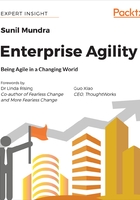
What is mindset?
There is no mention of the word mindset in the Agile Manifesto or the principles. Nonetheless, it is now widely recognized and accepted that agility needs a specific type of mindset, as indicated in aforementioned Denning's quote.
There is a formal definition available of the word mindset, but not in the context of Agile or agility. The word mindset is defined as "a set of assumptions, methods, or notations held by one or more people or groups of people." [iv] The closest anyone has come to defining the Agile mindset is Linda Rising, the author and lecturer, who made a clear distinction between the fixed and Agile mindsets, by contrasting their characteristics. According to Rising, an Agile mindset has the ability to grow like a muscle and has learning as the primary goal. The outlook towards challenge is to embrace it and be resilient and to view failure as something which provides information, alongside a belief that effort leads to mastery. [v]
In simple terms, mindset reflects an individual's mental inclination or way of thinking. What underlies an individual's mindset is their attitudes, beliefs, perceptions, and values:
- Attitude: A firm way of thinking about something, which can be positive or negative, for example, I will not hesitate to ask for help when I am having difficulty in solving a problem because I am inspired by others' success
- Belief: A state of mind which treats something as true, regardless of whether it is provable or not, for example, diversity of thought leads to better decisions or constructive feedback is helpful
- Perception: An interpretation of reality, as seen through a "lens," for example, I am paid a fair salary
- Value: The worth/importance attached to something, which is sometimes used as a synonym for principle, for example, respect or courage